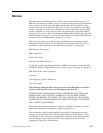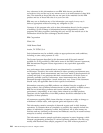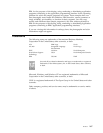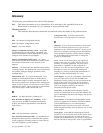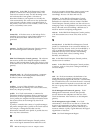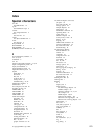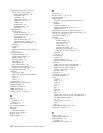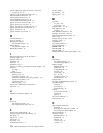
Glossary
The following cross-references are used in this glossary:
See: This refers the reader to (a) a related term, (b) a term that is the expanded form of an
abbreviation or acronym, or (c) a synonym or more preferred term.
Obsolete term for:
This indicates that the term should not be used and refers the reader to the preferred term.
A
ACF. See Adapter Configuration Facility.
ACP. See adapter configuration profile.
adapter. See event adapter.
Adapter Configuration Facility (ACF). In the IBM
Tivoli Enterprise Console product, a graphical user
interface that enables a Tivoli administrator to easily
configure and customize event adapters.
adapter configuration profile (ACP). In a Tivoli
environment, an IBM Tivoli Enterprise Console profile
that contains information for one or more event
adapters.
attribute. A characteristic that identifies and describes
a managed object. The characteristic can be determined,
and possibly changed, through operations on the
managed object.
authorization role. In a Tivoli environment, a role
assigned to Tivoli administrators to enable them to
perform their assigned systems management tasks. A
role may be granted over the entire Tivoli management
region or over a specific set of resources, such as those
contained in a policy region. Examples of authorization
roles include super, senior, admin, and user.
B
BAROC. See Basic Recorder of Objects in C.
Basic Recorder of Objects in C (BAROC). In the
event server of the IBM Tivoli Enterprise Console
product, the internal representation of the defined
event classes.
C
CDS. See class definition statement.
class definition statement (CDS). For the IBM Tivoli
Enterprise Console product, a statement that specifies
(a) the mapping of incoming events to classes and (b)
the values assigned to event attributes.
configuration file. A file that specifies the
characteristics of a system device or network.
E
endpoint. (1) In a Tivoli environment, a Tivoli client
that is the ultimate recipient for any type of Tivoli
operation. (2) In a Tivoli environment, a Tivoli service
that runs on multiple operating systems and performs
Tivoli operations on those systems, thereby enabling
the Tivoli Management Framework to manage the
systems as Tivoli clients.
event. In the Tivoli environment, any significant
change in the state of a system resource, network
resource, or network application. An event can be
generated for a problem, for the resolution of a
problem, or for the successful completion of a task.
Examples of events are: the normal starting and
stopping of a process, the abnormal termination of a
process, and the malfunctioning of a server.
event adapter. In a Tivoli environment, software that
converts events into a format that the IBM Tivoli
Enterprise Console product can use and forwards the
events to the event server. Using the Tivoli Event
Integration Facility, an organization can develop its
own event adapters, tailored to its network
environment and specific needs.
event class. In the IBM Tivoli Enterprise Console
product, a classification for an event that indicates the
type of information that the event adapter will send to
the event server.
event console. In the IBM Tivoli Enterprise Console
product, a graphical user interface (GUI) that enables
system administrators to view and respond to
dispatched events from the event server. The Tivoli
Event Integration Facility does not directly use or affect
event consoles.
event group. In the IBM Tivoli Enterprise Console
product, a set of events that meet certain criteria. Each
event group is represented by an icon on the event
console. Tivoli administrators can monitor event groups
that are relevant to their specific areas of responsibility.
© Copyright IBM Corp. 2002 169







